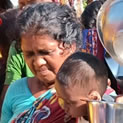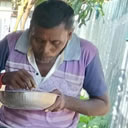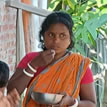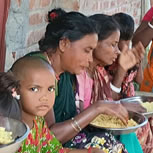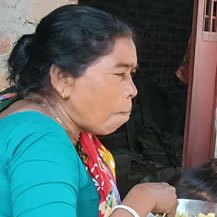Bangladesh Food Relief by Lotus Ministry Trust: Support & Impact
- Jeffrey Dunan
- Oct 15, 2025
- 17 min read
Updated: Nov 5, 2025
Key Takeaways
Lotus Ministry Trust provides culturally-appropriate food aid that serves as both immediate relief and a foundation for long-term food security in Bangladesh.
Every $50 donation to Lotus Ministry Trust feeds a family of five for an entire month, with efficient distribution systems ensuring aid reaches those most in need.
Climate change has severely worsened Bangladesh's food crisis, with the 2022 floods destroying crops across northern regions and leaving thousands of families vulnerable.
Women and children bear the heaviest burden of food insecurity in Bangladesh, with malnutrition rates particularly high among rural communities.
Beyond immediate hunger relief, Lotus Ministry Trust combines nutritional support with education and empowerment, creating lasting impact in rural Bangladesh.
Bangladesh Food Relief: Why Urgent Relief Matters Now
Lotus Ministry Trust's Director Of Asian Development
Bangladesh stands at a critical crossroads of climate vulnerability and food insecurity. In rural communities across this South Asian nation, millions of families face daily uncertainty about their next meal, with the situation worsening amid economic pressures, environmental degradation, and the lingering effects of the pandemic. What makes this crisis particularly devastating is its impact on a population already struggling with limited resources and infrastructure to respond effectively.
The numbers tell a sobering story about the scale of hunger in Bangladesh today. According to recent assessments, over 40 million Bangladeshis experience food insecurity, with rural populations facing the most severe challenges. This isn't simply about missing meals—it's about entire communities lacking consistent access to the nutrition necessary for health, development, and productivity. When families can't meet basic nutritional needs, every aspect of life suffers, from children's cognitive development to adults' ability to work and care for their families.
"The food crisis in Bangladesh isn't just a humanitarian concern—it's a complex emergency requiring both immediate relief and sustainable solutions. What we're seeing is the intersection of climate change, economic vulnerability, and systemic challenges creating perfect storms of food insecurity for millions." - Lotus Ministry Trust Field Report, 2025
What distinguishes the current crisis from previous food security challenges is its persistence and complexity. Bangladesh has always faced seasonal hunger periods, locally known as "monga," but climate change has intensified these cycles while creating new pressure points. The combination of more frequent flooding, unpredictable rainfall patterns, and rising temperatures has undermined traditional agricultural systems that rural communities have relied upon for generations. This is where organizations like Lotus Ministry Trust have stepped in with targeted interventions that address both immediate hunger relief and the underlying causes of food insecurity.
Current Crisis Statistics and Affected Regions
The geography of hunger in Bangladesh reveals distinct patterns of vulnerability across the country's landscape. Northern regions, particularly districts like Kurigram, Gaibandha, and Jamalpur, consistently face the highest rates of food insecurity, with some communities reporting that over 60% of households cannot reliably meet their nutritional needs. Following the devastating 2022 floods, these areas saw massive crop destruction, leaving more than 5,000 families in immediate need of food assistance. Lotus Ministry Trust's ground assessments confirm that in many villages, families have been forced to reduce both the quantity and quality of meals, often limiting themselves to a single daily serving of rice with minimal nutritional variety.
Perhaps most alarming are the rates of chronic malnutrition that accompany acute food shortages. In the districts where Lotus Ministry Trust operates, stunting affects up to 40% of children under five, while micronutrient deficiencies—particularly iron, vitamin A, and zinc—are widespread even among families that manage to secure daily rice rations. These statistics underscore why food relief efforts must focus not only on caloric intake but also on comprehensive nutritional support that addresses these hidden hungers.
How Climate Change Has Worsened Food Insecurity
Bangladesh sits at the frontlines of climate change, experiencing its impacts not as theoretical future threats but as present-day realities that directly affect food production. The 2022 flooding that triggered Lotus Ministry Trust's intensive six-month rice distribution program represented not an anomaly but rather the acceleration of a troubling pattern. Over the past decade, Bangladesh has experienced five "hundred-year floods," each destroying crops, livestock, and food reserves across increasingly vulnerable agricultural zones. With each successive climate disaster, farming families lose not only their current harvest but also the seeds, tools, and resources needed to recover for the next growing season.
Rising temperatures have introduced new agricultural challenges beyond flooding. Pest populations previously limited by cooler seasons now thrive year-round, devastating rice paddies and vegetable plots that once provided reliable harvests. Changing rainfall patterns mean that traditional planting calendars no longer align with actual precipitation, leaving crops vulnerable to both drought and unexpected downpours. For communities with limited access to weather forecasting technology or alternative cultivation methods, these changes have transformed once-productive farms into increasingly unreliable food sources. When local food production falters, market prices rise, creating a secondary crisis for non-farming households who must purchase rather than grow their food.
The Most Vulnerable Groups: Women and Children
While food insecurity affects entire communities, its burden falls disproportionately on women and children. In the rural Bangladesh context, cultural practices often dictate that women eat last and least, particularly during periods of scarcity. Lotus Ministry Trust's household surveys reveal that in food-insecure families, women typically consume 20-30% fewer calories than male household members, with pregnant and lactating mothers particularly at risk. This nutritional inequity creates intergenerational consequences, as undernourished mothers give birth to low-weight babies who begin life with developmental disadvantages. Children in food-insecure households not only suffer immediate physical effects like weakened immune systems and stunted growth but also face cognitive impairments that affect school performance and future economic opportunities.
Lotus Ministry Trust: Life-Saving Food Relief in Action
The impact of Lotus Ministry Trust extends far beyond simple food distribution—it represents a comprehensive approach to addressing both immediate hunger and systemic food insecurity. Founded in 2021, this organization has rapidly established itself as a leader in effective, culturally-appropriate food aid that reaches Bangladesh's most vulnerable populations. Their response to the devastating 2022 floods showcases their capability to mobilize quickly and effectively during acute crises while maintaining focus on sustainable food security solutions.
What sets Lotus Ministry Trust apart is their deep understanding that food is not merely sustenance but also deeply cultural. Each aid package aligns with Bangladeshi dietary preferences and cooking practices, ensuring that families receive not just calories but comfort during times of extreme stress. This culturally-sensitive approach has proven crucial to recipient acceptance and program effectiveness, particularly in remote communities where traditional food practices remain central to daily life.
With every $50 donation feeding a family of five for an entire month, the Trust's efficient distribution systems create immediate, measurable impact. Their work extends across three northern districts where food insecurity rates are highest, reaching communities that larger international organizations often miss due to logistical challenges or limited local connections. By combining immediate relief with education and long-term resilience building, Lotus Ministry Trust addresses not just today's hunger but tomorrow's food security.
Rice Distribution: The Foundation of Their Relief Efforts

Bags Of Rice Ready To Be Distributed
At the center of Lotus Ministry Trust's food aid strategy is rice—Bangladesh's dietary staple and cultural cornerstone. While diversified nutrition is the ultimate goal, rice forms the foundation of their relief efforts for both practical and cultural reasons. A 10kg bag of rice provides approximately 35,000 calories, enough to meet the basic energy needs of a family of five for two weeks. During the intensive six-month program following the 2022 floods, the Trust distributed over 150,000kg of rice, creating a nutritional safety net for communities whose crops had been completely destroyed.
Rice distribution also offers significant logistical advantages in the challenging terrain of rural Bangladesh. It has a long shelf life even in humid conditions, requires minimal packaging, and can be transported efficiently even to remote areas with limited infrastructure. Perhaps most importantly, rice preparation methods are universally understood within recipient communities, requiring no additional education or unfamiliar cooking techniques. For families experiencing the trauma of disaster and displacement, receiving familiar food that can be prepared using traditional methods provides not just nutrition but also a sense of normalcy and dignity.
Nutritional Considerations in Food Package Design
While rice provides essential calories, Lotus Ministry Trust recognizes that comprehensive nutrition requires more. Their food aid packages are carefully designed to address the specific nutritional deficiencies common in rural Bangladesh, particularly among women and children. Each family receives not only rice but also lentils (a crucial protein source), fortified cooking oil (providing essential fatty acids and vitamins A and D), and iodized salt (addressing widespread iodine deficiency that affects cognitive development).
Through careful nutritional planning, Lotus Ministry Trust maximizes the impact of every dollar donated while addressing both immediate hunger and longer-term health concerns. Their approach recognizes that true food security encompasses not just sufficient calories but also balanced nutrition that supports proper development and immune function.
Community-Led Distribution Model
The effectiveness of Lotus Ministry Trust's food relief efforts stems largely from their community-led distribution model that places local leaders at the center of decision-making and implementation. Rather than imposing external systems, the Trust identifies and partners with respected community members who have intimate knowledge of local needs, vulnerabilities, and appropriate distribution methods. This approach not only ensures aid reaches those most in need but also builds community capacity and ownership that extends beyond the immediate relief period.
Each distribution event becomes an opportunity for community building and education rather than merely a handout. Local volunteers manage registration, verification, and distribution processes, gaining valuable organizational skills while ensuring cultural appropriateness and dignity for recipients. The Trust's field teams provide training and oversight but intentionally step back to allow community leadership to flourish. This model has proven particularly effective in reaching women-headed households, elderly individuals, and persons with disabilities who might be overlooked in less personalized distribution systems.
Real Impact: Families Fed and Communities Strengthened
The statistics of Lotus Ministry Trust's work tell one part of their impact story: over 25,000 families reached, more than 100,000 individuals fed, and approximately 1,500,000kg of food distributed during four years supplying food aid. Yet the true measure of impact comes through individual stories of transformation that ripple outward from food security to other aspects of community well-being. When families no longer face constant hunger, children return to school, parents can focus on rebuilding livelihoods, and community resilience grows.
In the village of Kurigram, where flooding destroyed 90% of rice crops, the Trust's immediate food relief prevented a potential exodus of working-age adults to overcrowded cities in search of income. By stabilizing the food situation, families could remain together during the recovery period, maintaining social cohesion and allowing for faster agricultural rehabilitation once floodwaters receded. Similar patterns emerged across all three districts where the Trust operates, with food security creating the foundation for broader recovery and development efforts that would have been impossible amid acute hunger.
Beyond Immediate Relief: Building Long-Term Resilience
While emergency food distribution forms the foundation of Lotus Ministry Trust's work, their vision extends far beyond immediate hunger relief. The organization operates on the principle that true food security requires addressing root causes rather than symptoms alone. Their comprehensive approach integrates immediate aid with education, skills development, and community capacity building to create sustainable pathways out of chronic food insecurity. This long-term perspective distinguishes their work from purely reactive relief efforts and magnifies the impact of every donation they receive.
Perhaps most significantly, the Trust's approach recognizes that food security is interconnected with other aspects of community development including water access, healthcare, education, and economic opportunity. Their programs increasingly reflect this holistic understanding, creating synergies between food relief and other development initiatives that strengthen overall community resilience. This integrated approach ensures that progress in one area supports rather than undermines advancements in others.
Partnership with Local Organizations and Communities
Lotus Ministry Trust's success stems largely from their commitment to meaningful partnerships rather than unilateral action. By collaborating with local farmers' associations, women's groups, religious institutions, and government agencies, they ensure their interventions complement existing initiatives and respect established community structures. These partnerships multiply impact while building local capacity that remains after the Trust's direct involvement ends.
Beyond formal organizations, Lotus Ministry Trust places special emphasis on partnering directly with community members in program design and implementation. Monthly community forums allow beneficiaries to provide feedback, suggest improvements, and participate in decision-making about future initiatives. This participatory approach ensures programs remain culturally appropriate and responsive to actual rather than perceived needs, significantly increasing their effectiveness and sustainability.
How $10 Feeds a Family for a Week: The Economics of Food Aid
Understanding the economics behind Lotus Ministry Trust's food relief efforts reveals how even modest donations create significant impact. Through careful planning, local sourcing, and efficient distribution systems, the Trust has optimized their operations to maximize nutritional impact per dollar donated. For just $10, they can provide a family of five with essential food items for an entire week – a remarkable return on investment in human terms.
This efficiency stems from several key operational strategies. By purchasing food items in bulk directly from local producers, the Trust eliminates multiple middlemen while supporting regional economies. Their streamlined logistics model minimizes transportation and storage costs without compromising food safety or quality. Perhaps most importantly, their community-based distribution approach relies heavily on trained volunteers rather than paid staff, directing maximum resources toward food purchases rather than administrative overhead.
"Every $50 donation feeds a family of five for an entire month. We've developed systems that ensure maximum impact from every contribution, transforming donor generosity into nutritional security for families facing impossible choices." - Lotus Ministry Trust Annual Report
Breaking Down the Costs
From each $10 donation, approximately $8.50 goes directly to food purchases, with the remaining $1.50 covering essential logistics, quality control, and minimal administrative costs. This 85% direct-to-food ratio exceeds industry standards and reflects the Trust's commitment to maximizing donor impact. Through transparent financial reporting, donors can clearly see how their contributions translate directly into meals for families in need.
Local Sourcing: Multiplying Your Impact
Lotus Ministry Trust's commitment to purchasing food items locally whenever possible creates a multiplier effect that extends the impact of every donation beyond immediate hunger relief. By sourcing rice, lentils, and vegetables directly from Bangladeshi farmers, each food purchase stimulates local agricultural production and rural economies. This approach creates a virtuous cycle where food aid simultaneously addresses immediate hunger while strengthening the very food systems that will ultimately provide long-term security.
The economic ripple effects are substantial. For every $100 spent on local food purchases, an estimated $70 of additional economic activity is generated in the surrounding community as farmers and food processors circulate their earnings through local businesses. During the 2022-2023 program year, the Trust's local purchasing injected over $175,000 into rural economies across northern Bangladesh, supporting approximately 300 farming households beyond direct aid recipients. This economic stimulation helps communities recover more quickly from disasters while building resilience against future food crises.
Local sourcing also delivers significant environmental benefits by reducing the carbon footprint associated with food transportation. By purchasing from farmers within 50km of distribution points whenever possible, the Trust minimizes fuel consumption while ensuring maximum freshness of perishable items. This alignment of humanitarian, economic, and environmental goals exemplifies the integrated thinking that characterizes the Trust's approach to sustainable food security.

A Lotus Ministry Community Food Distribution Event
5 Ways You Can Support Bangladesh Food Relief Today
The scale of food insecurity in Bangladesh can seem overwhelming, but meaningful action is within everyone's reach. Whether you have financial resources, time, skills, or simply a voice to raise awareness, your contribution can make a tangible difference in the lives of families struggling to meet basic nutritional needs. Here are five concrete ways to support Lotus Ministry Trust's vital food relief efforts in Bangladesh.
1. Make a One-Time or Monthly Donation
Direct financial contributions remain the most flexible and efficient way to support Lotus Ministry Trust's work. Every donation directly impacts food security in Northern Bangladesh, with even modest amounts making a significant difference. A one-time gift of $50 provides a month of essential nutrition for an entire family, while $600 sustains that family throughout a full year of food insecurity. For those able to make a more substantial impact, $2,500 funds a complete village-level distribution serving approximately 50 families with immediate food relief.
Monthly recurring donations are particularly valuable as they allow the Trust to plan long-term programs with confidence. A monthly commitment of just $10 feeds a family weekly throughout the year while giving the organization predictable resources for sustainability planning. These recurring gifts enable the Trust to maintain consistent support for vulnerable communities between major fundraising campaigns and during periods when food insecurity receives less media attention.
The simplest way to donate is through the Trust's secure online portal at https://www.gofundme.com/f/urgent-food-relief-assistance-in-bangladesh, which accepts major credit cards and digital payment options. For those preferring traditional methods, checks can be mailed to their registered office, or bank transfers arranged for larger contributions. Every donation, regardless of size, directly translates into meals for families facing impossible choices between food and other essential needs.
2. Start a Fundraising Campaign
Multiplying your impact through personal fundraising creates ripple effects that extend far beyond what you might accomplish alone. The Trust's user-friendly fundraising platform allows supporters to create customized campaigns for birthdays, holidays, athletic events, or any meaningful occasion. These peer-to-peer campaigns typically raise an average of $350, enough to provide over 1,700 meals to families in need.
Workplace giving campaigns offer another powerful multiplication opportunity. Many employers match charitable contributions, potentially doubling or even tripling your impact without additional cost to you. The Trust's development team can provide all necessary documentation for corporate matching programs and can support employee-led fundraising initiatives with materials, presentations, and impact reports tailored to your specific workplace context.
Faith communities, schools, and civic organizations have proven particularly effective fundraising partners. The Trust provides customized resources for community-based campaigns, including presentation materials, suggested activities, and specific project options that groups can "adopt" for their fundraising focus. These community campaigns not only raise essential funds but also build awareness and connections between donors and beneficiary communities in Bangladesh.
3. Spread Awareness on Social Media
In today's connected world, raising your voice for causes that matter creates ripples of awareness that can ultimately translate into tangible support. Sharing information about Bangladesh's food crisis and Lotus Ministry Trust's effective response helps combat the "compassion fatigue" that often surrounds ongoing humanitarian challenges. The Trust's social media toolkit provides compelling content, impactful statistics, and authentic imagery that you can share across platforms to educate your network about both the need and the solutions available.
Beyond simply sharing content, becoming a "Digital Ambassador" for the Trust multiplies your awareness-raising impact. These volunteers commit to regular advocacy on social platforms, engaging with comments, answering questions, and connecting interested supporters with donation opportunities. The role requires minimal time commitment but significantly extends the Trust's outreach capacity by leveraging authentic peer-to-peer communication channels.
For those with professional communications skills or significant social media influence, the Trust offers more structured partnership opportunities. Content creators, writers, photographers, and influencers can contribute their talents through the "Creative Partners" program, which provides guidance on effective humanitarian communication while respecting the dignity and agency of aid recipients. These partnerships have proven particularly effective at reaching younger donors who prefer to engage through digital rather than traditional channels.
4. Corporate Partnerships and Matching Programs
Businesses seeking meaningful social impact opportunities find valuable partnership potential with Lotus Ministry Trust. Corporate giving programs can take numerous forms, from simple donation matching for employee contributions to more comprehensive partnerships that align with corporate social responsibility goals. The Trust's corporate engagement team works closely with partner companies to design customized programs that create meaningful impact while engaging employees and stakeholders in the mission.
Product-based partnerships offer creative opportunities for businesses to support food security while engaging customers in their social mission. Whether through percentage-of-sale donations, buy-one-give-one programs, or limited-edition products that benefit the Trust, these initiatives create mutual value while addressing critical needs. The Trust particularly welcomes partnerships with food companies, agricultural businesses, and other organizations whose expertise aligns with food security solutions.
For larger corporations seeking substantial and measurable impact, the Trust offers exclusive "Impact Partner" opportunities that fund comprehensive programs in specific geographic areas. These partnerships include customized reporting, site visits when possible, employee engagement opportunities, and communication materials that showcase the partnership's impact. This level of engagement creates transformative possibilities for communities while providing corporations with authentic social impact that resonates with employees and customers alike.
5. Volunteer Remotely or On-Site
Skills-based volunteering offers professionals in various fields the opportunity to contribute their expertise to strengthening the Trust's food security work. Whether you're a nutritionist who can advise on food package composition, a logistics expert who can optimize distribution systems, or a translator who can help with Bengali communications, your specialized knowledge can multiply the impact of the Trust's programs. Remote volunteering options make these contributions possible regardless of your geographic location.
Your Gift's Journey: From Donation to Dinner Table
Day 1: Your donation is processed and allocated to the most urgent food relief needs
Days 2-5: Procurement team purchases rice, lentils, oil and other essentials from local suppliers
Days 6-7: Community volunteers prepare individual family packages according to household size
Days 8-10: Distribution events deliver food directly to verified recipient families
Day 11 and beyond: Follow-up monitoring ensures aid reached intended recipients and measures impact
Understanding how your contribution transforms into actual meals provides a concrete connection to the impact you're making. When you donate to Lotus Ministry Trust, your gift initiates a carefully orchestrated process designed to maximize both efficiency and dignity for recipients. Within 24 hours of receiving your donation, the Trust's program team allocates the funds to specific communities based on current vulnerability assessments and food security gaps.
The local procurement phase represents a critical step where your donation begins creating multiple impacts. Rather than importing food aid, the Trust's procurement specialists purchase rice, lentils, oil and other essentials from local markets and agricultural cooperatives whenever possible. This approach not only ensures culturally appropriate food items but also stimulates local economies and reduces environmental impact from transportation. Quality control specialists verify all purchases meet safety and nutritional standards before items enter the distribution system.
Community involvement distinguishes the packaging and distribution phases of the process. Local volunteers, many of whom were once aid recipients themselves, prepare individual family packages according to household size and specific nutritional needs. These community members receive training in food safety, recipient verification, and dignified distribution practices. Their involvement creates employment opportunities while ensuring cultural appropriateness and community ownership of the relief process.
Perhaps most importantly, your donation initiates a relationship rather than a simple transaction. Each food distribution includes information about nutrition, food preparation, and available support services. Recipients are invited to participate in follow-up programs that address longer-term food security, from agricultural training to microenterprise development. This holistic approach ensures your gift continues creating impact long after the immediate food needs are met.
Be Part of the Solution: Take Action Today
The food crisis in Bangladesh demands urgent action, but it is not insurmountable. Through Lotus Ministry Trust's effective, community-centered approach, your support creates immediate relief while building pathways to sustainable food security. Every donation, regardless of size, translates directly into meals for families facing impossible choices between food and other essential needs. By acting today, you become part of a compassionate global community standing in solidarity with Bangladesh's most vulnerable populations.
Whether through financial contributions, awareness-raising, or skills-based support, your involvement makes a tangible difference in addressing one of humanity's most fundamental needs. The families receiving food aid through the Trust aren't anonymous statistics but real people with names, stories, and immense potential that hunger puts at risk. Your support helps ensure children can learn, parents can work, and communities can thrive rather than merely survive. In a world of complex challenges, providing food security remains one of the most direct and impactful ways to create positive change.
Join Lotus Ministry Trust in creating a future where no Bangladeshi family goes to bed hungry. Learn more about their community impact and visit their donation page today to start your journey from compassionate concern to meaningful action.
Frequently Asked Questions
Below are answers to the most common questions about Lotus Ministry Trust's food relief efforts in Bangladesh. This information helps donors make informed decisions about their support while understanding the complexities of food insecurity in Bangladesh.
How does Lotus Ministry Trust ensure food aid reaches the most vulnerable families?
Lotus Ministry Trust employs a multi-layered verification system to identify and reach the most vulnerable households. The process begins with community mapping exercises that involve local leaders, healthcare workers, and government representatives to identify areas of highest need. Within these communities, the Trust uses specific vulnerability criteria including household composition (prioritizing female-headed households, elderly without support, and families with malnourished children), economic indicators (landlessness, absence of steady income, lack of assets), and food security status (meal frequency, dietary diversity, coping mechanisms). This assessment process is regularly reviewed and refined based on field observations and recipient feedback to ensure it accurately identifies those in greatest need.
What percentage of my donation goes directly to food relief efforts?
Currently, 85% of every donation goes directly to food procurement, packaging, and distribution. The remaining 15% covers essential operating costs including local staff salaries, transportation, quality control, monitoring and evaluation, and minimal administrative expenses. This ratio exceeds industry standards for humanitarian organizations and reflects the Trust's commitment to maximizing donor impact. The Trust maintains this efficiency through strategic partnerships, volunteer engagement, and technology solutions that streamline operations without compromising program quality or accountability.
Can I specify which region in Bangladesh my donation supports?
Yes, donors making contributions of $500 or more can request allocation to specific regions within the Trust's operational areas of Kurigram, Gaibandha, or Jamalpur districts. For donations under that threshold, the Trust directs resources to communities with the most urgent current needs based on ongoing vulnerability assessments. This flexibility allows the organization to respond quickly to emerging crises while honoring the intentions of major donors. All designated gifts receive region-specific impact reports showing exactly how funds were utilized and the outcomes achieved.
How sustainable are Lotus Ministry Trust's food relief efforts?
While immediate food distribution addresses urgent hunger, the Trust designs all interventions with sustainability as a core principle. Their three-phase approach begins with emergency relief but quickly transitions to recovery activities including agricultural rehabilitation, seed distribution, and livelihood restoration. The final phase focuses on resilience building through climate-adaptive farming techniques, diversified income sources, and community-based food security systems like grain banks and cooperative farming arrangements. This graduated approach ensures communities move from dependency to self-sufficiency at an appropriate pace, with approximately 65% of beneficiary households achieving stable food security within 18 months of initial support.
Are donations to Lotus Ministry Trust tax-deductible?
Yes, Lotus Ministry Trust is a registered 501(c)(3) nonprofit organization in the United States, making donations tax-deductible for US taxpayers to the extent allowed by law. For donors in other countries, the Trust can provide documentation for tax benefits according to local regulations where applicable. Receipt letters containing all information required for tax purposes are automatically generated for all donations of $10 or more, with custom documentation available upon request for specialized giving arrangements including stock transfers, donor-advised fund recommendations, and legacy gifts.
For those concerned about proper tax documentation, the Trust's donor services team can provide guidance specific to your situation, including assistance with employer matching programs, gifts of appreciated securities, and other non-cash contributions. Their commitment to transparent financial management ensures donors receive appropriate recognition and documentation for all charitable contributions.


